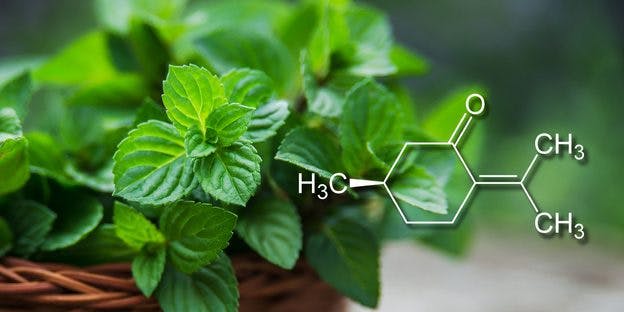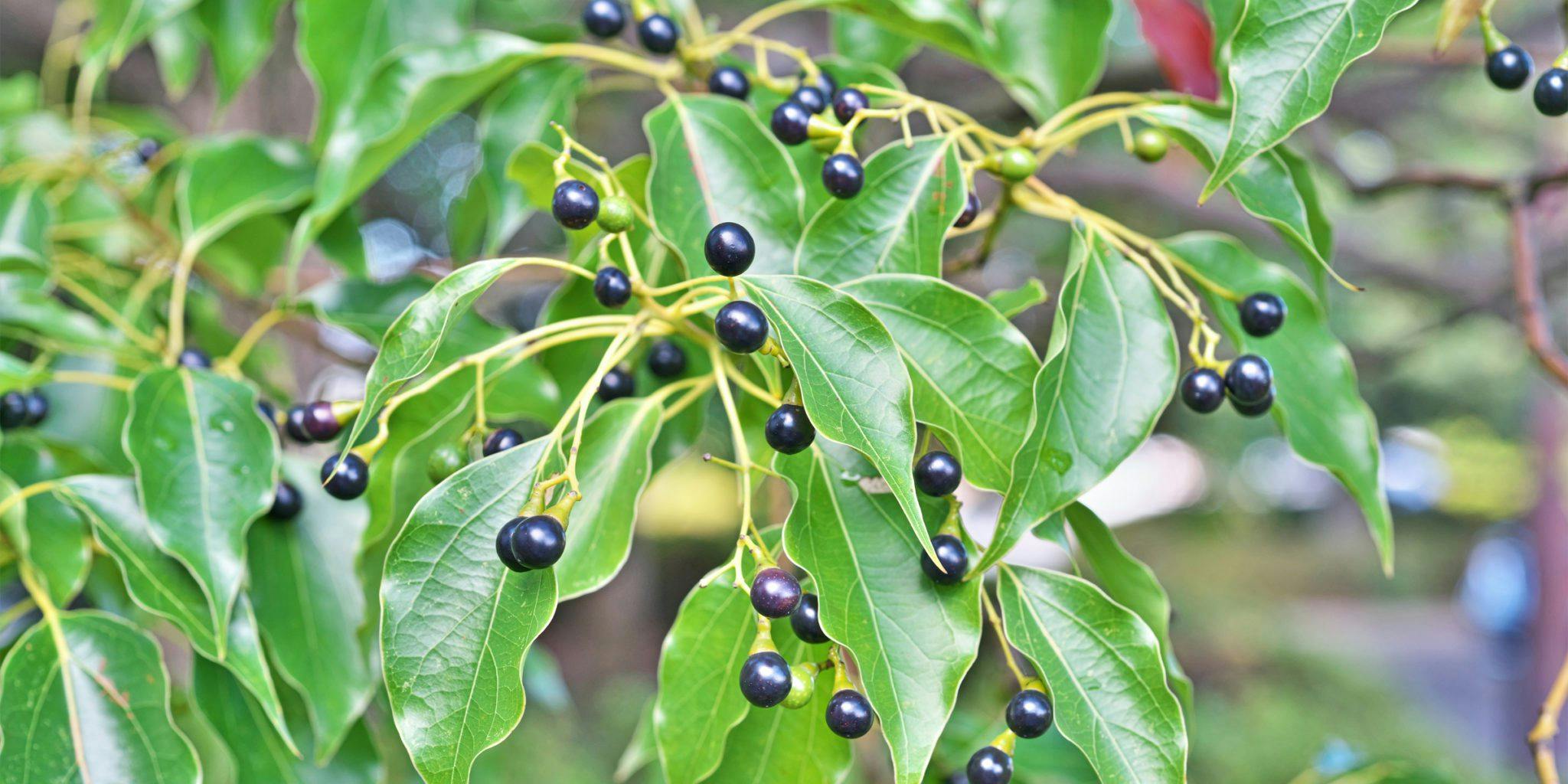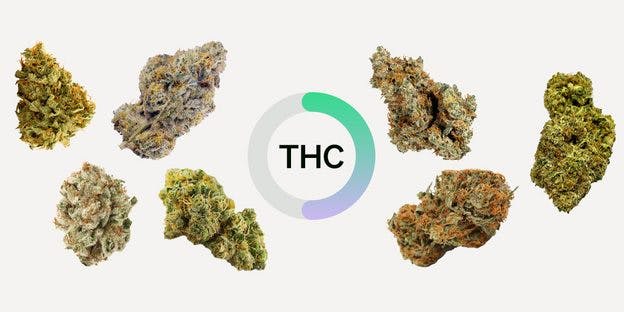What Is Pulegone?

Article written by

Dipak HemrajHead of Research and Education
Content reviewed by

Dr. Lewis JasseyMedical Director - Pediatric Medicine
Pulegone is generally found in plants of the Lamiaceae family, such as catnip, mentha piperita, and pennyroyal, as well as in many types of cannabis. Pulegone has a fresh peppermint aroma, which gives plants containing this compound their natural scent. Because of this fresh fragrance, pulegone is used widely in personal care items such as hygiene products, cosmetics, and perfumes.
The uses of pulegone don’t end here, however, as its historical use may indicate its potential to act as a therapeutic agent for many types of health concerns, including dyspepsia (indigestion), nausea, and anxiety.
Get your medical marijuana card
Connect with a licensed physician online in minutes.
What is Pulegone?
Because of pulegone’s pleasant natural minty fragrance and taste, it’s used in many products, such as baked goods, ice creams, candies, alcohol, cosmetics, perfumes, and hygiene products. It’s also sometimes used to brew tea.
Additionally, pulegone has been used in traditional medicine to treat colds and coughs while helping to reduce fevers. Because of its traditional uses, scientists became interested in this monoterpene and began working to determine if pulegone exhibited any documentable therapeutic benefits for treating many health concerns. Since then, studies have shown pulegone’s potential to treat many conditions, such as inflammation, bacterial and viral infections, pain, and anxiety.
Health Benefits of Pulegone
Despite the work that has been done, research on pulegone generally remains insufficient and scarce, with very few preclinical studies and almost no human studies to demonstrate its therapeutic effects.
However, in the preclinical studies conducted, pulegone has been shown to act as a therapeutic agent in many areas, showing positive therapeutic benefits for health concerns such as inflammation, bacterial and viral infections, pain, and anxiety.
Download Guide To Anxiety and Medical Cannabis
Anti-inflammatory
Pulegone and menthol acted as an effective anti-inflammatory and anti-hyperalgesic agents in an in vitro study conducted in 2021 using Calamintha nepeta and Mentha piperita extracts.
Antimicrobial
As terpenes are generally seen as antimicrobial agents, it was assumed this would also be the case for pulegone. This was confirmed in a study by Dr. Guido Flamini’s team on essential oil from the plant Calamintha nepeta. Flamini found that pulegone was an effective antimicrobial agent, especially on the salmonella strain bacteria that cause food poisoning-type infections.
Antiviral
In an in vivo mouse study conducted in 2013, pulegone was found to be an effective therapeutic agent for decreasing the burden of viral influenza infections. However, pulegone only lessened the symptoms of the virus; it did not affect preventing the viral infection from occurring.
Analgesic
Whether for intermittent aches and pains or pain that may be more chronic, pulegone may be able to help. In an in vivo animal study conducted in 2011 by the Department of Physiology at the University of Sergipe, pulegone was shown to be an effective analgesic agent that inhibits nociception (the sensory process that results in the sensation of pain). This was demonstrated through the hot plate test, in which the heat tolerance of mice injected with pulegone was measured. This study showed that nociception was inhibited in the pulegone-treated mice, suggesting that pulegone has analgesic properties.
Anti-convulsant
The same study conducted by theUniversity of Sergipe also examined the effect of pulegone on epilepsy. It was found that a latency effect existed between convulsions when pulegone was given subcutaneously to the mice. This indicates an anti-epileptic impact that could be used clinically.
Antianxiety (Anxiolytic)
A 2014 study on animal models found that pulegone exhibited both a stimulatory effect and depressive effect based on dose. The study showed that pulegone acts through mechanisms different from the actions of known drugs such as a benzodiazepine. Pulegone demonstrated an anxiolytic effect when dosed and that the effects were dose-dependent, with the highest doses resulting in the most anxiolytic effects.
Unfortunately, all the above studies were preclinical and based on cell line studies or animal models. Because of this, it is difficult to determine if pulegone would have the same therapeutic effect on humans and if the compound could be manufactured as a drug to be used clinically.
More in-depth studies are needed on the effects of pulegone before it can be used clinically to treat health concerns. Until then, it can still be used as a nonprescription remedy for various conditions, but its effects must be considered anecdotal, without scientific backing, and its usage comes with potential risks.
Potential Risks And Side Effects
Although used in many products, including food and beverages, Pulegone has a moderate risk of causing harm to the person ingesting the compound and has been classed as a potentially poisonous substance.
Studies conducted on animal models have found that oral consumption of pulegone acts as a carcinogen that may be linked to several cancers, including hepatic carcinomas, pulmonary metaplasia, and other neoplasms.
Cannabis Strains High in Pulegone
Cannabis strains contain many terpenes; however, many terpene concentrations, including pulegone, can change drastically depending on the strain. Listed below are five cannabis strains high in pulegone.
- OG Kush
- Pink Kush
- Zprite
- Motorbreath
- Pina Colada
Get Your Medical Card
Connect with a licensed physician online in minutes.
Frequently Asked Questions
What is Pulegone good for?
Due to its pleasant fragrance and taste, pulegone is a great addition to products made to smell minty and fresh. Pulegone is used in various products, such as fragrances, shampoos and conditioners, candles, detergents, and insect repellents. Additionally, pulegone is used in the food industry to make baked goods, candies, and beverages.
What does Pulegone taste like?
Pulegone has a scent and taste similar to menthol, giving off a minty fresh aroma and flavor that can be used in many foods and drinks.



